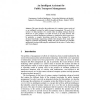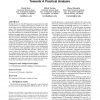1662 search results - page 202 / 333 » The Computational Complexity of Agent Design Problems |
AIPS
2009
13 years 10 months ago
2009
Dynamic plan execution strategies allow an autonomous agent to respond to uncertainties while improving robustness and reducing the need for an overly conservative plan. Executive...
ICIC
2005
Springer
14 years 2 months ago
2005
Springer
This paper describes the architecture of a computer system conceived as an intelligent assistant for public transport management. The goal of the system is to help operators of a c...
ATAL
2003
Springer
14 years 2 months ago
2003
Springer
Despite the success of the BDI approach to agent teamwork, initial role allocation (i.e. deciding which agents to allocate to key roles in the team) and role reallocation upon fai...
DAC
2006
ACM
14 years 10 months ago
2006
ACM
Ever-growing complexity is forcing design to move above RTL. For example, golden functional models are being written as clearly as possible in software and not optimized or intend...
AIEDAM
2008
13 years 9 months ago
2008
Although it is known that quantum computers can solve certain computational problems exponentially faster than classical computers, only a small number of quantum algorithms have ...


